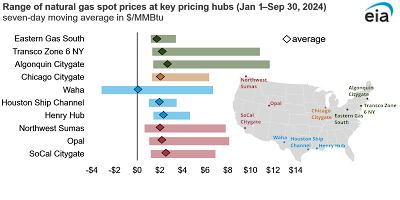Natural gas market dynamics vary across the U.S., according to the U.S. Energy Information Administration, with a key pricing hub in the Northeast showing both high prices and high price volatility due to constrained infrastructure and a changing supply mix.
According to EIA, natural gas is traded at about 200 pricing hubs across North America, with prices varying widely based on factors including location, weather conditions, proximity to supply, pipeline constraints and bottlenecks.
EIA produced the graphic below, showing the range of natural gas spot prices at seven key pricing hubs for the first nine months of 2024. It shows that the Algonquin Citygate pricing hub experienced the highest average price over this time period, as well as the highest spot price and the largest price volatility (or range of prices).
 |
| Chart source: U.S. Energy Information Administration |
According to EIA:
Algonquin Citygate is an important pricing hub in the northeastern United States, and prices at this hub reflect natural gas market dynamics in Boston, Massachusetts, and elsewhere in New England. New England relies heavily on natural gas for heating in the winter months, but supplies are constrained by the region’s limited natural gas pipeline capacity and changing fuel mix. Price volatility at Algonquin Citygate is typically related to these periods of peak demand.As EIA notes, natural gas pipeline constraints contribute to high prices and price volatility in New England, particularly during the winter heating season.

